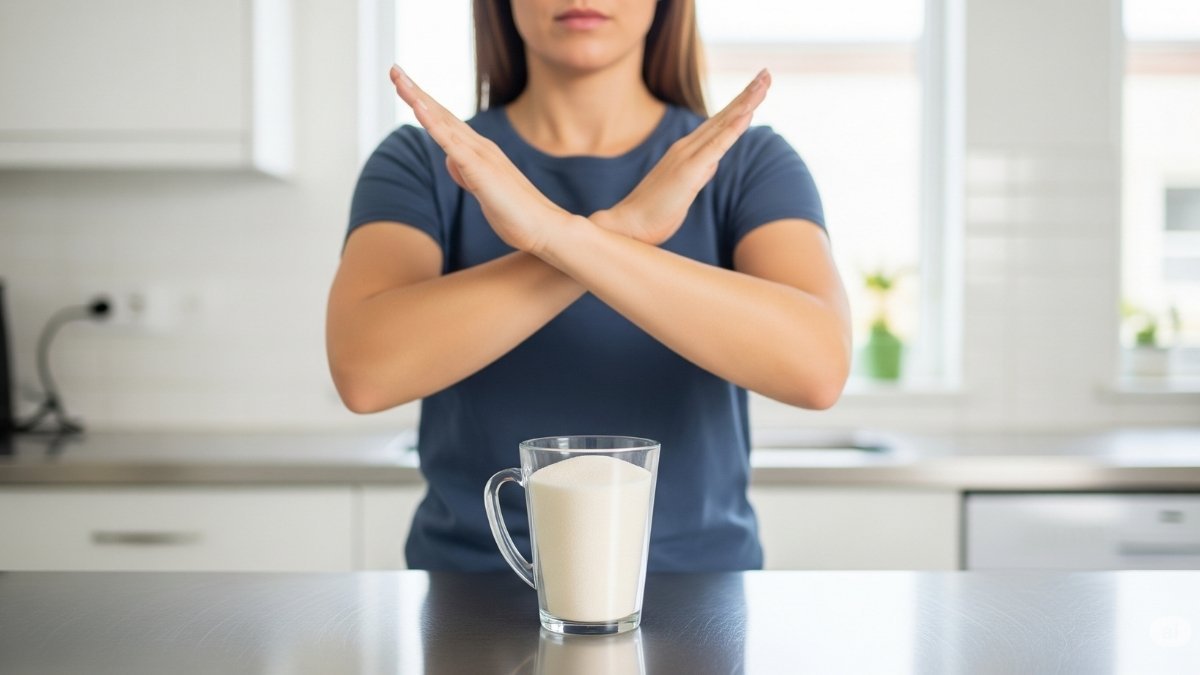
You know that 3 PM energy crash? The one where you’re practically face-planting into your keyboard, desperately reaching for another coffee or candy bar? Yeah, that’s your brain on sugar. And honestly, we’re all addicted – even if we don’t want to admit it.
Here’s the kicker: Americans are downing 17 teaspoons of added sugar every single day. That’s like eating 5 donuts’ worth of sugar daily. Men are hitting 24 teaspoons. I know, I know – you’re probably thinking “but I don’t even eat that much candy!” Plot twist: sugar is hiding everywhere. Your “healthy” yogurt, that innocent-looking granola bar, even your pasta sauce.
But what if I told you that quitting sugar for just 30 days could rewire your brain? That within 48 hours, you’d feel like a completely different person? And that the changes happening in your body are so dramatic, they rival what happens with actual pharmaceutical treatments?
Buckle up, because what doctors are discovering about sugar withdrawal is wild.
Your Brain on Sugar Is Basically Your Brain on Drugs
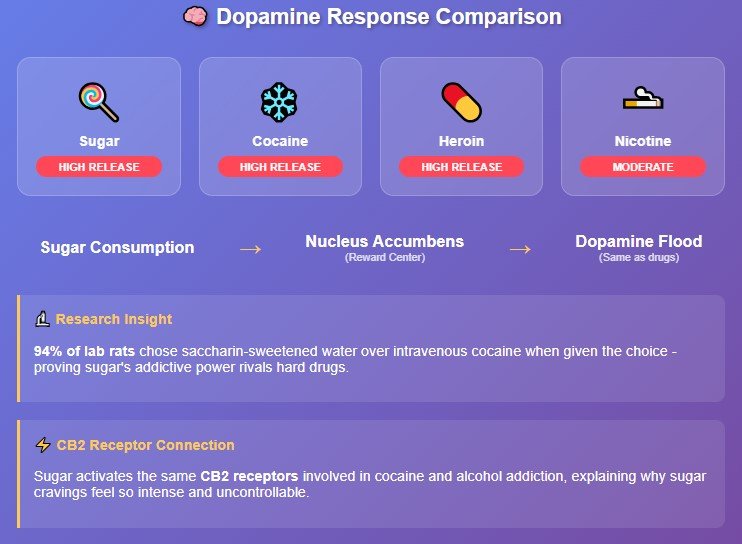
Let’s get real for a second. When researchers hooked people up to brain imaging machines and watched what happened when they ate sugar, they found something pretty shocking. Sugar lights up the same brain pathways as cocaine and heroin.
I’m not being dramatic here – this is straight-up neuroscience. Dr. Mark Hyman from the Cleveland Clinic puts it perfectly: “Sugar affects a part of the brain that actually makes you addicted. This dopamine response… it’s the same thing that happens with sugar, or cocaine, or heroin.”
Princeton University researchers proved this by giving lab rats a choice between saccharine-sweetened water and intravenous cocaine. Want to guess what 94% of them chose? The sweet stuff. Every time.
So when you’re standing in front of the fridge at 10 PM, desperately hunting for something sweet, you’re not lacking willpower. You’re experiencing the same neurochemical drive that keeps people hooked on hard drugs.
Days 1-3: Welcome to Sugar Withdrawal Hell
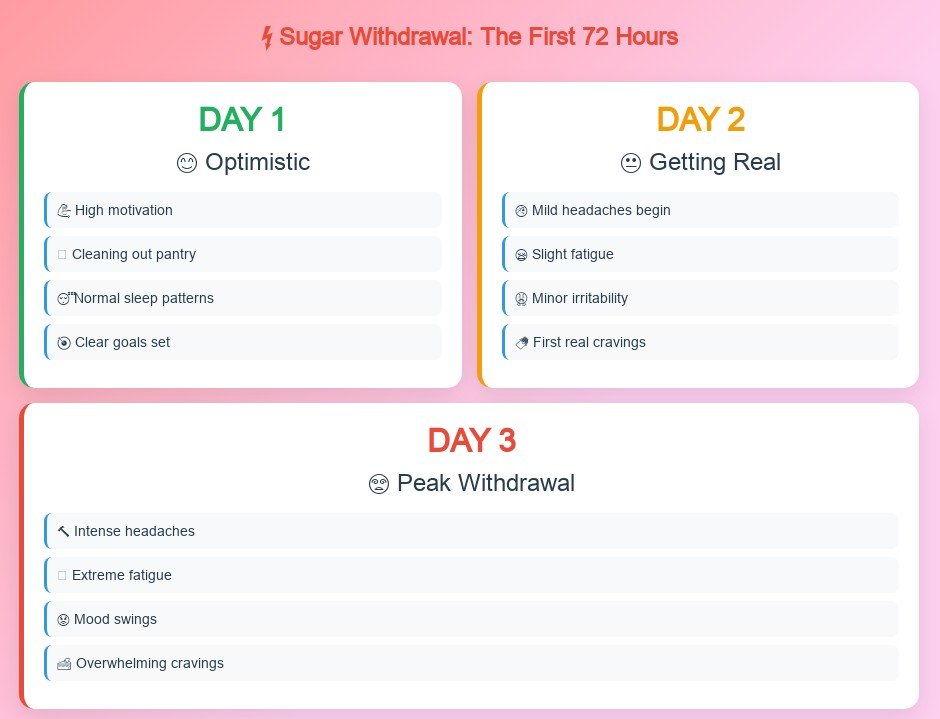
Okay, let’s talk about what happens when you decide to quit cold turkey. And yes, I said withdrawal – because that’s exactly what it is.
Day 1 usually starts fine. You’re motivated, you’ve thrown out all the cookies, and you’re feeling pretty good about yourself.
Day 2 is when things get interesting. You might notice:
- Your head starts pounding (and not just from stress)
- You feel weirdly tired even though you slept fine
- Everything is slightly more annoying than usual
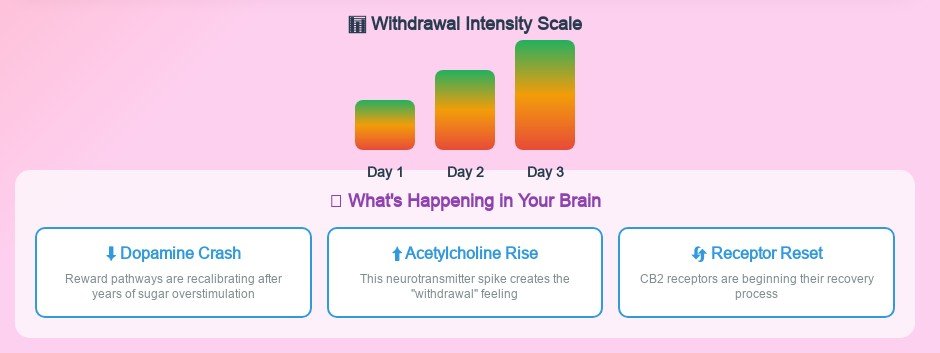
Day 3-5 is where the real fun begins. This is peak withdrawal territory, and honestly, it can feel pretty rough. Here’s what you might experience:
- Headaches that feel like your brain is in a vice
- Fatigue so intense you could nap standing up
- Mood swings that would make a teenager jealous
- Cravings so strong you’d consider licking a candy wrapper
- Sleep that’s either non-existent or you’re hibernating
But here’s the thing – and this is crucial – this is your brain chemistry literally rewiring itself. Your dopamine levels are bottoming out while other neurotransmitters are going haywire. It’s temporary, and it means the process is working.
Days 4-7: The Light at the End of the Tunnel
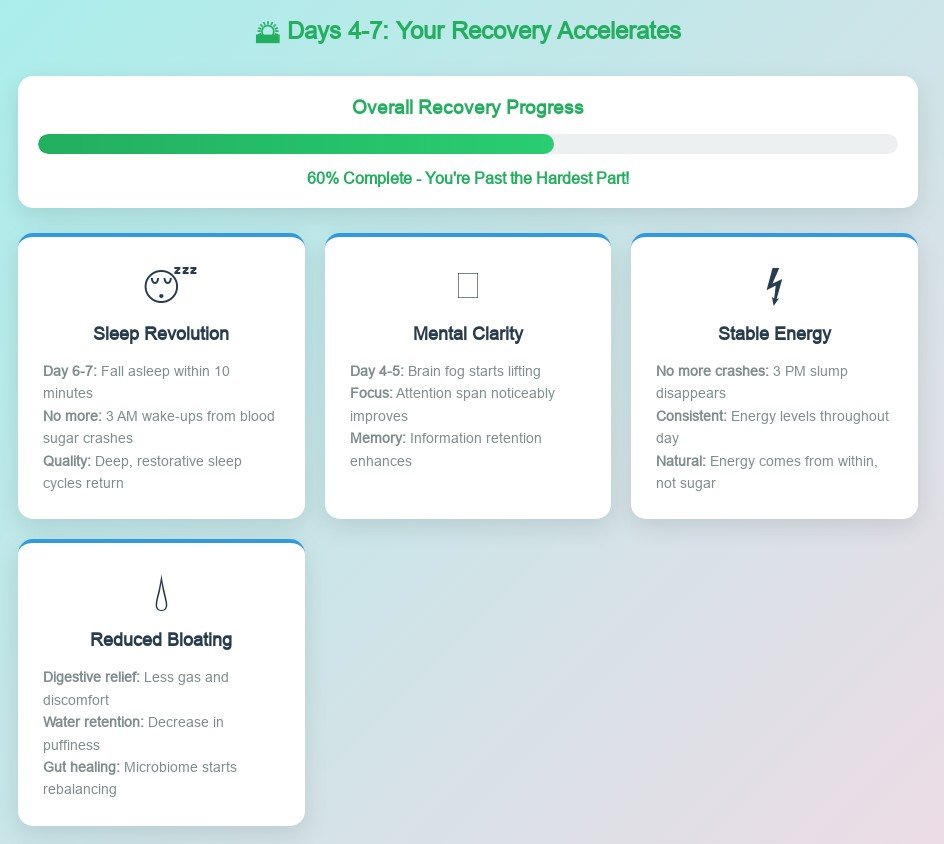
By day 4 or 5, something magical starts happening. Remember dietitian Brooke Alpert’s words: “By the fourth day, an apple tastes like candy. The onions are sweet! Almonds are sweet! Once you take sugar away from your diet cold turkey, your palate recalibrates.”
This isn’t just about taste buds. Your entire relationship with food is shifting.
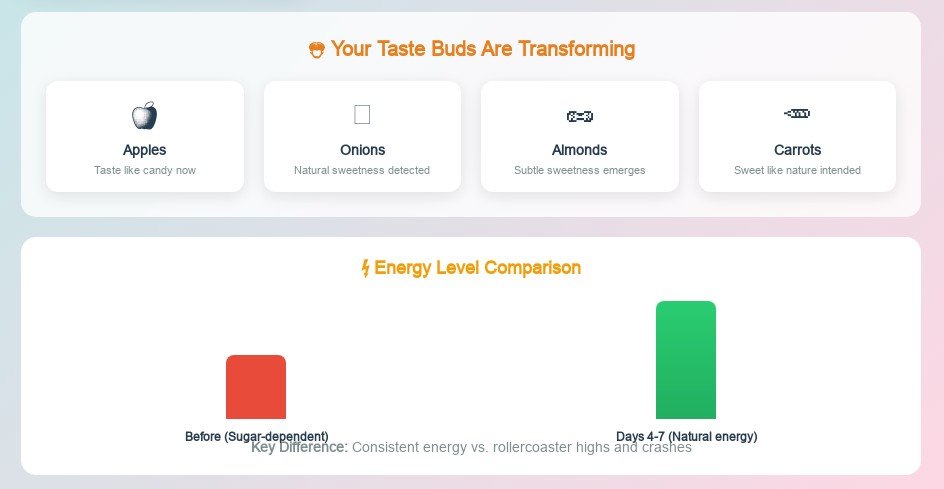
People report some pretty amazing changes during this first week:
- Sleeping like a baby (many people say they fall asleep within 10 minutes by day 6-7)
- Steady energy instead of the roller coaster
- Less bloating and digestive issues
- Clearer thinking – like someone adjusted the focus on your mental camera
Dr. Hyman says his patients tell him, “within 48 hours, they’re like, ‘Oh my God. I feel totally different.'” And the science backs this up completely.
Week 2: Your Body Starts Its Amazing Comeback

This is where things get exciting. While you’re probably feeling pretty good by now, your body is working overtime behind the scenes.
Your liver is doing a victory dance. Research shows that just 8 weeks of sugar restriction can reduce liver fat by 10.5%. Since your liver is essentially the center of detoxification in your body, this is significant for your overall health.
Your skin starts clearing up. No, seriously. Sugar causes inflammation throughout your body, and your skin is often the first place you see improvements. Many people notice fewer breakouts and better skin tone within just 2 weeks.
Your brain fog lifts. Remember how I mentioned sugar blocks memory receptors? When you remove it, cognitive function bounces back quickly. One person documented a dramatic improvement
Week 3-4: The Transformation Gets Real
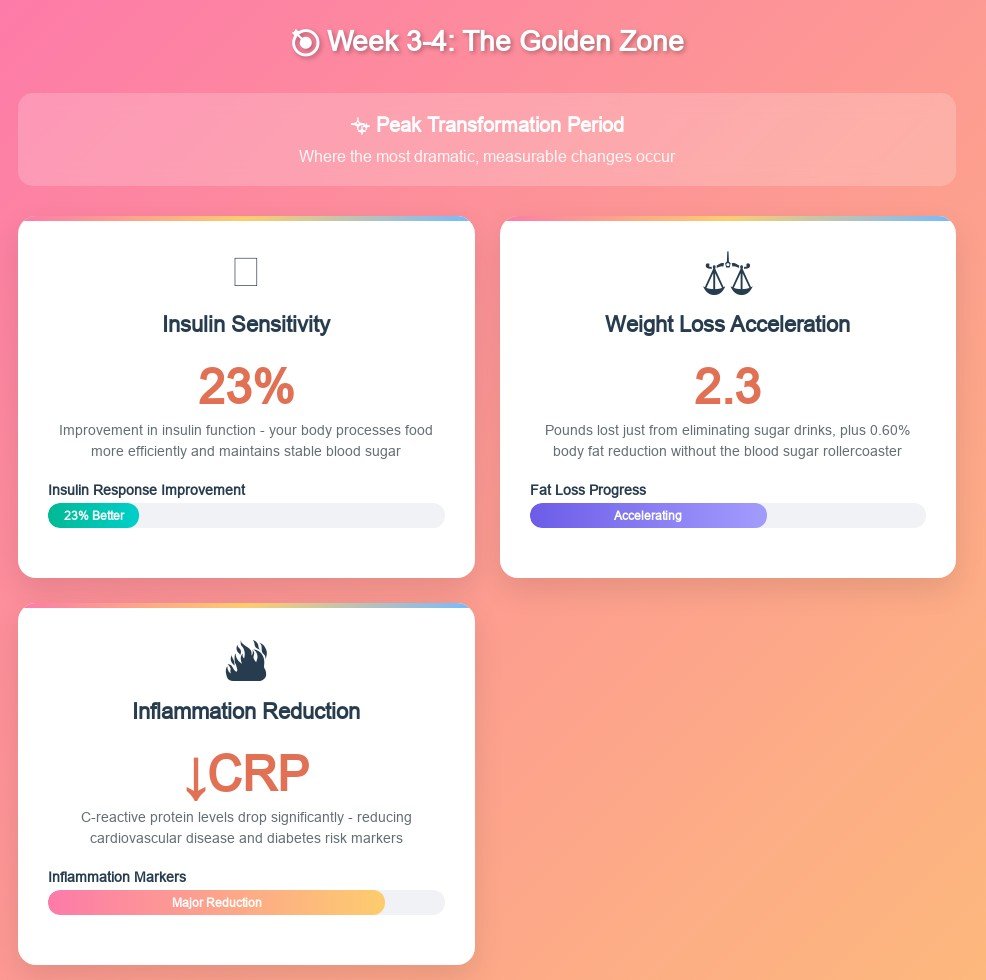
By week 3, you’re entering what I like to call the “golden zone.” This is where the theatrical changes happen.
Your insulin sensitivity improves by 23%. This is massive. Better insulin sensitivity means your body processes food more efficiently, you have more stable energy, and you’re at lower risk for diabetes.
Weight loss accelerates. Studies show that just cutting out sugar-sweetened drinks leads to about 2.3 pounds of weight loss and 0.60% body fat decrease. But it’s not just the calories – it’s that you’re no longer on the blood sugar roller coaster that triggers reactive eating.
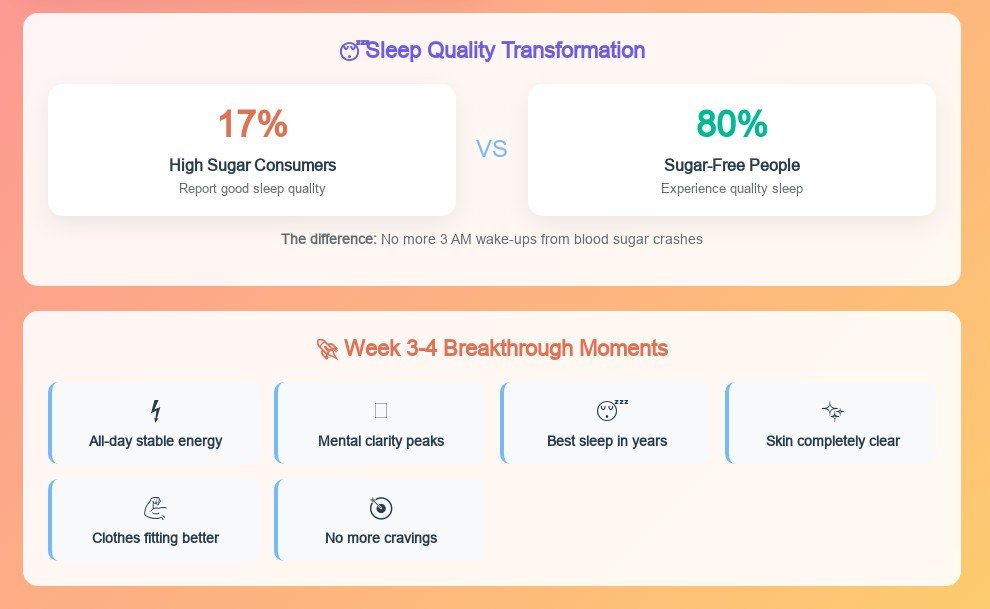
Your sleep becomes incredible. Research shows that people with high sugar intake have terrible sleep quality – only 17% report good sleep. When you quit sugar, many people report the best sleep of their adult lives.
The Science Behind Why This Works So Fast

Here’s what’s happening in your body that makes these changes so rapid:
Your dopamine receptors are healing. After years of being overstimulated by sugar, these receptors are finally getting a chance to reset to normal sensitivity levels.
Inflammation is dropping like a rock. Sugar causes inflammation throughout your body. When you remove it, inflammatory markers like C-reactive protein drop significantly within weeks.
Your taste buds are changing. Those 10,000 taste buds on your tongue regenerate every 1-2 weeks. When you stop flooding them with sugar, they become sensitive to natural sweetness again.
But Let’s Be Honest – It’s Not All Rainbows
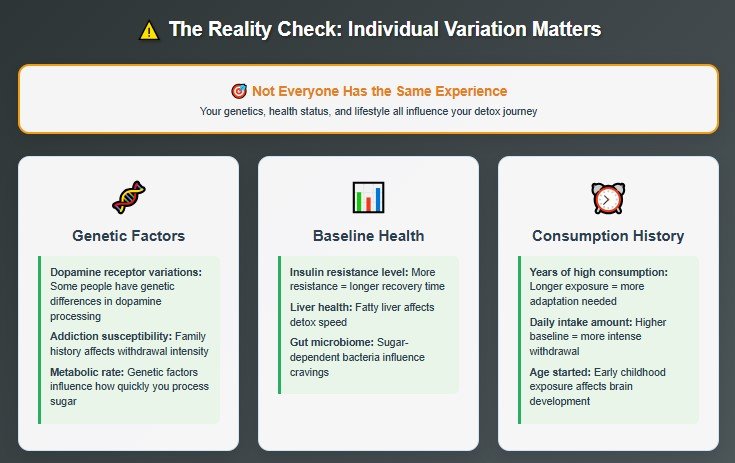
I’d be lying if I said this was easy for everyone. Some people have a rougher time than others, and that’s totally normal.
Genetic factors play a role. Some people have genetic variations that make them more sensitive to dopamine changes, which can make withdrawal more intense.
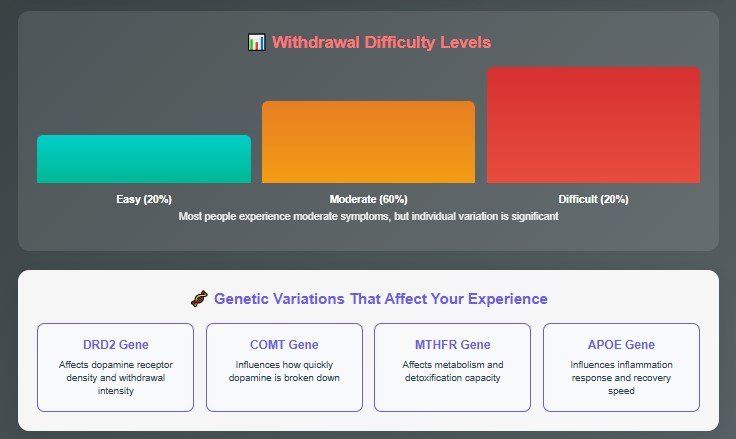
If you have diabetes or metabolic syndrome, you should talk to your doctor before making dramatic dietary changes.
Gradual reduction might work better for some people. While “cold turkey” works great for many, others find a 7-21 day gradual reduction easier to handle.
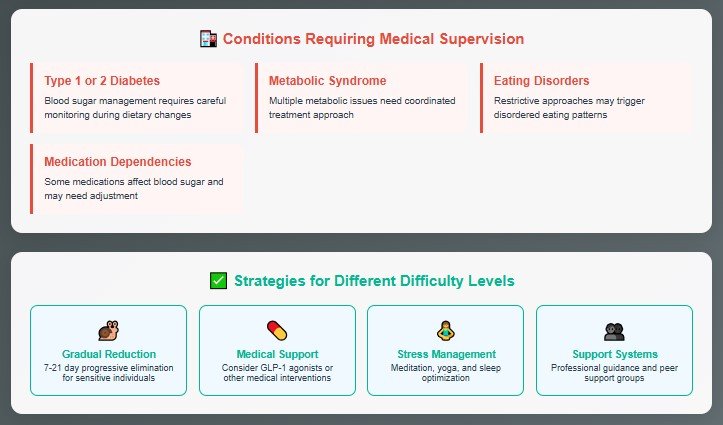
Your Game Plan for Success
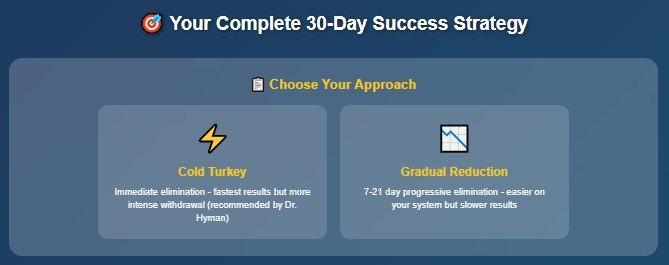
Ready to try this? Here’s what actually works, according to the research:
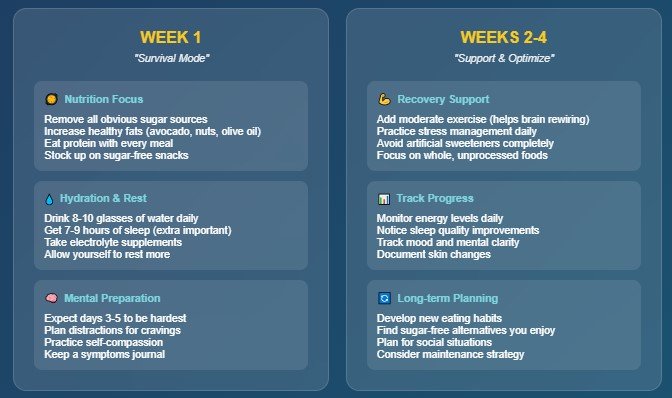
Week 1: Focus on Survival
- Remove all obvious sugar sources
- Increase healthy fats (they help reduce cravings)
- Drink tons of water
- Get extra sleep
- Be patient with yourself
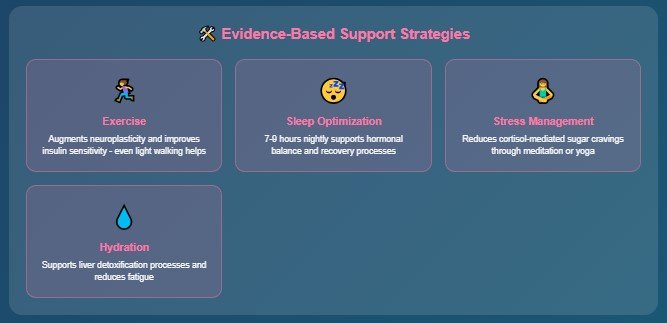
Week 2-4: Support Your Body
- Add more protein to stabilize blood sugar
- Exercise (it helps your brain rewire faster)
- Manage stress (cortisol drives sugar cravings)
- Avoid artificial sweeteners (they keep your sweet tooth active)
Immediate Action
Take a 5-minute walk, do jumping jacks, or call a friend
Smart Snacks
Nuts, seeds, hard-boiled eggs, or cheese to stabilize blood sugar
Mindset Reset
Remember: cravings peak at 10-15 minutes then fade naturally
Natural Alternatives
Herbal tea, sparkling water with lemon, or sugar-free gum
The Bigger Picture
Here’s something that’ll blow your mind: in 1700, the average person ate 4.9 grams of sugar daily. Today, 50% of Americans consume 227 grams daily. That’s a 4,500% increase in just three centuries.
We’re basically running a massive science experiment on ourselves, and the results aren’t pretty. Analysis shows that sugar consumption is responsible for 2.2 million new diabetes cases and 1.2 million new heart disease cases globally every year.
But here’s the empowering part: you can reverse this damage faster than you think.
What Doctors Are Saying
The medical community is finally catching up to what many people have experienced firsthand. Dr. Frank Hu from Harvard’s School of Public Health warns: “Your liver metabolizes sugar the same way as alcohol, and converts dietary carbohydrates to fat.”
New research is even exploring pharmaceutical support for sugar dependence, with early studies showing that medications like GLP-1 agonists can reduce sugar cravings by affecting the same dopamine pathways.
The Bottom Line
Here’s what 30 days without sugar can do for you:
✅ Neurological recovery – your brain literally rewires itself
✅ Metabolic reset – 23% improvement in insulin sensitivity
✅ Liver recovery – 10.5% reduction in liver fat
✅ Better sleep – many report the best sleep of their lives
✅ Clearer skin – reduced inflammation shows up fast
✅ Stable energy – no more 3 PM crashes
✅ Weight loss – without the constant blood sugar roller coaster
✅ Improved mood – once you get through the initial withdrawal
The crazy part? Most of these changes start within the first week. Some people feel dramatically different within 48 hours.
Ready to Give It a Try?
Look, I’m not going to sugarcoat this (pun intended). The first few days can be rough. But thousands of people have done this, and the results speak for themselves.
If you’re thinking about trying a 30-day sugar detox, start by reading labels and tracking how much sugar you’re actually consuming. You might be shocked. Then decide if you want to go cold turkey or gradually reduce over a week.
Either way, your body – and your brain – will thank you for it. And who knows? You might just discover what it feels like to have energy that doesn’t come from a sugar high.
Have you ever tried quitting sugar? What was your experience like? The science is clear: your body has an amazing capacity to heal itself when you give it the chance. The question is, are you ready to find out what you’re really capable of?






